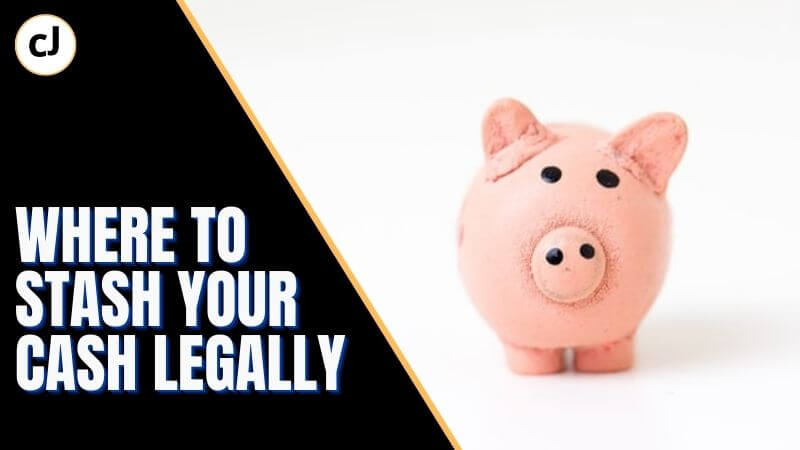Have you ever wondered where to stash your cash legally? Or why do people stash their money in banks? What is it that makes banks so safe? Most of our money is in any kind of banking account. After all, it is the preferred place to put our money, sometimes even safer than keeping it at home.
Nowadays, it has become easier and more accessible to have a bank account. You go to the bank, open an account that it’s consistent with your needs, and deposit money in it. We do this almost instinctively: using the bank as the main option to deposit our money.
Bank accounts and deposits are the most widely used product for storing savings. This usually helps you meet your daily needs, such as paying in stores, shopping for groceries, paying for utilities, shopping online, and even saving.
According to experts, money is indeed safer in the bank. In fact, they do encourage people to prefer banks over other options. The old saving method, putting money under the mattress, is no longer the best tactic to keep money safe. After all, it has now become the target of thieves.
However, banks are not the only option to deposit your money. There are other places you can actually stash your cash completely legal.
These other options besides your checking account could be even more profitable. Especially if you are trying to avoid inflation.
Quick Navigation
Where to Stash Your Cash Legally
Now, let’s take a closer look at the several alternatives to keep your money safe and maybe make some profit out of it.

Storing money at home
There is no doubt that saving under the mattress is the oldest saving method in the world. But the real question is: is it safe to keep your money at home?
The answer is yes and no. It is essential to have a small amount of cash at home for paying your daily expenses. The amount may vary among people depending on everyone’s requirements. This should be a relatively low figure.
The drawbacks of saving at home
Basically, keeping large amounts of money at home would be a bad idea, mainly because:
- Your savings will not earn any interest. Every year your money loses value, devaluing at the same time your purchasing power. Having your money in some other place could mean accumulating a lot of money by applying compound interest.
- It is not risk-free. Money stashed at home is not covered by most insurance policies. This means your cash could be destroyed by a flood, an earthquake, catch fire, but there won’t be any compensation after. Even if you insure your home against all risks, the odds are that the insurer probably won’t include your cash savings in the policy.
- You could get robbed. Although housebreakings and robberies may not be very common or frequent, thieves are getting really skilled at circumventing security systems. So, think that if you have all your money saved at home and someone walks in, they probably won’t leave you a dollar.
- It encourages unnecessary spending. Having cash all the time, at easy access, tends to make people spend more than what they really need. Think about it: if you need it, it’s just steps away.
Hence, if your idea is to avoid depositing all your money in the bank and, in addition, you are aware of the risks involved in leaving money hidden at home “under the mattress”, it will be necessary to look for other alternatives. There are some options to keep savings safe.

Understanding Independent Investment Management
One option is to use independent managers to deposit money in investment funds. This way your money will not be directly affiliated with any bank or brokerage firm.
What is an Investment Manager?
An investment manager is a person or organization that makes investment decisions about portfolios of securities on behalf of clients under the investment objectives and parameters the client has defined. An investment manager usually has extensive experience in the world of private banking.
In other words, an investment manager is a portfolio manager. They offer their clients investment recommendations from an objective perspective. Their job is to handle all their clients’ portfolios and make sure they effectively allocate clients’ investments to investments that will generate high returns with little or no cost.
An investment manager is in charge of all activities surrounding the client’s portfolio, from buying to selling to monitoring and measuring the performance, and of course client reporting.
What is the benefit of an independent investment manager?
One of the best benefits of an independent investment manager is that they usually have their own money invested just as they invest your money. In a way, they have the same objective as you do, making this one of the most reliable options to stash money legally.
As they don’t work for a bank entity, they are more likely to offer their clients objective investment recommendations. They are not looking to sell you any bank product, like a proprietary bank investment mutual fund, so their position is more suitable to the client’s needs and possibilities.
Independent investment managers focus on the client. They offer a bureaucratic-free environment since they develop a close personal relationship with their client. In order to build a portfolio, an investment manager will first analyze the client’s needs, such as age, health, investment experience, personal preferences, family circumstances, among others. Clients will never have to step a foot into a bank office.
Considering their main focus is the client, they regular report updates to make sure their clients’ circumstances are the same or have changed, or if they are satisfied with their portfolio performance, and to list securities figures.
Nowadays, independent investment managers are gaining more importance in the local market as the fund industry is rapidly expanding. Since these managers are not linked to banks, they are treading stronger, offering a more simple, flexible, and personal solution, especially among large investors.
The Stockbrokers world
Another option is stockbrokers, which do not belong to any bank and can be done virtually.
What Is a Stockbroker?
A stockbroker, also known as Registered Representative (RR), is a financial professional who executes orders in the market on behalf of clients. They have the authority to buy and sell stocks and securities in a stock exchange.
A stockbroker or broker is an intermediary in the financial system. Their main function is to handle the transactions of movable assets buyers and sellers. In other words, the broker is the connection between supply and demand in the stock market.
A broker can be performed by a stockbroking firm, but they can also be an independent person. Any person can become a stockbroker as long as they have the authorization of their country’s respective regulatory entity. For example, in the U.S., a broker must be authorized by the FINRA. In order to operate, a broker is required to maintain a minimum amount of equity and/or liquidity.
What are the benefits of hiring a stockbroker?
One of the benefits of going to a stockbroker is that they offer full guidance and advisory service. They know how the market works, so they will offer all their knowledge in order for you to buy and sell stocks and other securities in a safe way.
A broker also will make all the right questions in order to understand the client’s investment goals. Once they gather this information, they will set a strategy that can help their clients meet their investment objectives. Although online brokers might not offer personalized advice.
Another service brokers offer is to provide access to investment research. They have thoroughly researched securities, so they know when to sell and buy. In other words, they will provide their clients with in-depth information about a specific company, which is very important when making decisions on where and when to invest, which leads to the next benefit.
Brokers will make all investment decisions on the client’s behalf. As long as they’ve their client’s permission, of course. They will only bother their clients to let them know the decisions that have been taken. They handle all the transactions paperwork and keep a record act.
Remember that stockbrokers seek to make money, that is why as long as you earn, they will too. Hence they will take care of making you achieve your goals.

Getting automated with Robo advisors
Today, automation is the new alternative for capital management. This is why Robo Advisors are the third option to stash money legally. It invests in mutual funds and pension plans using an algorithm to decide the assets in which they invest based on the risk profile of each investor. Besides, it offers lower costs and better returns.
What is a Robo Advisor?
A Robo Advisor, also called automated manager, is a digital platform that provides automated, algorithm-driven financial planning services with little to no human supervision. The term Robo is short for Robot. Robo Advisor is a robotic advisor.
Robo Advisors are automated managers. Besides offering advice, they also manage money. They collect information from clients: their current financial situation and their future objectives uses this data and transform it through algorithms to offer an online investment portfolio management service.
Even though they are completely automated, Robo Advisors are usually supervised by a team of senior investors.
What are the advantages of a Robo Advisor?
Since Robo Advisor is an automated platform, one of the main benefits it offers is an opportunity not only to avoid but to mitigate emotional biases. Human emotions are extremely present in investment decisions. Emotions commonly affect people’s decisions, leading to overreact in certain scenarios instead of using rationality. However, it is important to also understand that sometimes emotions explain price bubbles and market behavior.
Another main benefit is the low fees making it very competitive in a regulated and controlled market. Nowadays, Robo Advisors are on average one third cheaper than any other traditional investment option.
Robo Advisors offers simplicity, accessibility, and availability. It is easy to use making it accessible for any person with little knowledge to create an individual investment portfolio tailored to their needs and possibilities. All procedures are done online at any time on any day.
Due to its algorithm nature, portfolio creation and maintenance are fully automated. It allows customizing a standardized product for each client. And it also reduces to a large degree operational risk.
Cryptocurrency
Cryptocurrencies are getting more popular in the investing world these days. Especially in recent years, it has made many people more interested in learning about this new digital asset. That’s the reason it is another option to where to stash money legally.
What is cryptocurrency?
Cryptocurrencies are another alternative in the investment world. Although the most renowned is Bitcoin, there are many other options.
A cryptocurrency, also known as “Crypto”, is a digital currency that can be used to buy goods and services, but uses an online ledger with strong cryptography to secure online transactions. It is not backed by real assets or tangible securities, like the real currency, like dollars.
Cryptocurrency offers individual investors a unique opportunity to get into what is still very much an emerging technology.
It is a new form of online payment that can be traded for goods and services. In order for cryptocurrencies to work, they use a technology called blockchain. Blockchain is known as the most advanced and secure digital technology. It is a decentralized technology that allows computers to manage and record transactions.
Many experts explain cryptocurrencies by comparing them to arcade tokens or casino chips. You’ll need to exchange real currency for the cryptocurrency to access the good or service.
What are the advantages of using cryptocurrencies?
Even though there’s a high risk involved in using cryptocurrencies, there’s also a high-reward opportunity.
Depending on the algorithm, most cryptocurrencies operate within a decentralized technology. This means they are not subject to regulations or any other governmental control. Every user has the same rights and is equal to each other, providing a greater sense of security among investors.
Since there is no intermediary in the transactions, cryptocurrencies offer low transactions costs. Unlike banking and electronic payment systems, users have the ability to independently set the commission size and even send transactions without it.
The last-mentioned provides confidentiality. In fact, privacy is one of the main advantages of cryptocurrencies. It allows investors to remain anonymous and hide their costs. Making people the only owner of their money.
Last but not least, cryptocurrencies are not sensitive to inflation. They have an advanced inflation prevention mechanism. Although cryptocurrencies might be unstable, a recent study by Piplsay shows that 50% of Americans think investing in cryptocurrency is safe.
The bottom Line
As foreseen, there are many options to store money legally without even going to the bank. Answering the question of where to stash your cash legally however, be aware when choosing one of these or any other options. The financial industry is changing every year. Analyze risks, benefits, disadvantages. Be astute and make deep research on where and to whom you’re about to give your money.
Always remember the best investment advice given by Warren Edward Buffett, business magnate, investor, and philanthropist, “Invest in what you know…”

